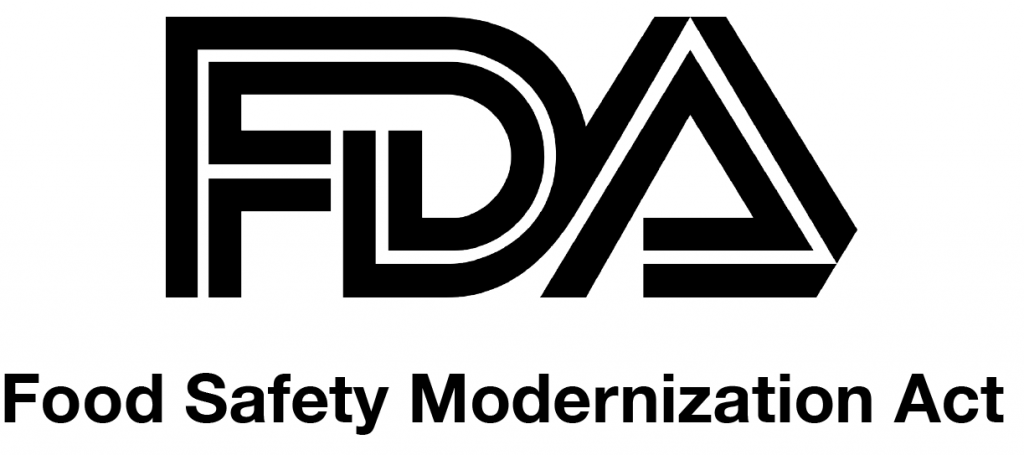The Food Safety Modernization Act
FSMA, the Food Safety Modernization Act by the FDA, is a piece of legislation passed in 2011, intended to increase the safety of food manufacturing and distribution for consumers by giving the FDA new powers that it didn’t have before. All food manufactures and food distributors need to know what’s included in this act, but unfortunately, as with most laws, the actual document can leave food companies with more questions than answers.

Fortunately, we’re here to help you make sense of it. There are five main facets of this key piece of legislation that food manufacturers need to know.
Background
First, it’s helpful to have a little background about this law and why it was passed. The Center for Disease Control (CDC) estimates that one in six Americans get sick from foodborne pathogens each year, with 128,000 hospitalizations from this illness and 3,000 deaths. Approximately 44 percent of all hospitalizations and all deaths can be traced back to 31 known pathogens. The outbreaks of these pathogens are largely preventable with the proper regulations and oversight—meaning 128,000 hospitalizations and 3,000 deaths could be prevented every year if we instated proper controls.
FSMA gives the FDA more authority to prevent and mitigate damage from these types of outbreaks.
The most important FSMA elements to know
In theory, that all sounds good, but what does that mean for you?
1) New fees for producers and distributors.
To help pay for the increased attention and human resources necessary for regular inspections, producers and importers are now required to pay a $500 annual registration fee. This alone will not cover the full cost of the legislation, with the FDA incurring a $2.2 billion net cost overall.
2) New mandatory safety standards for buildings and areas of business.
There are significant new rules and standards for producers and distributors everywhere, and it would be impossible to recount them all concisely. Many of these are preventative controls for food facilities, which include eliminating hazards, implementing new steps in production, establishing better systems of supervision and monitoring, and having better damage control processes in place. Thankfully, these rules aren’t one-size-fits-all; instead, they’re broken down by the type of food producer you are (produce vs. animal foods, for example) and by the size of your business. You’ll want to review these rules as they specifically apply to your business (see link above).
3) Mandatory regular inspections by the FDA.
To institute better policies, inspect execution, and ensure ongoing compliance, the FDA has also been given the power to perform routine inspections. The frequency and intensity of these inspections depend on your individual circumstances.
4) FDA mandatory recalls.
Occasionally, even the best systems will leave the possibility of contaminated batches during food production. When those batches make it to the public, it’s important to prevent any further spread of the contaminated products. Historically, food production companies have done a mediocre job of mitigating the potential damage here, so FSMA has imbued the FDA with new powers that allow it to dictate a mandatory recall to protect consumers.
5) Greater punitive measures for non-compliance.
There are also stricter penalties if a facility is found in non-compliance, or if it is responsible for distributing a food item with the potential to inflict serious health consequences. For example, the FDA can now suspend the registration of any facility if one of its food products poses a significant chance of harm or death to consumers.
What the future may hold
Even though the legislation is a few years old, it’s still relatively new in its existence, and probably has many developments in store for it in the future. Congress is working on new rules, regulations, and modifications to make consumers safer and make the logistics of the new law more feasible, and in a few years, the FDA may be given more power or less power, depending on the results of the program as it exists today. Keep a close eye on new developments and new regulations as they apply to your business, and try to remain in the best possible compliance to avoid both stiff FDA penalties and consumer-driven PR disasters.
How software can aid in recall readiness
Highlighted in point #4, being recall ready is a major part of being FSMA compliant. Depending on the size of your operations, you are going to need software to help you integrate all of your production, warehouse and ordering data in order to complete a full recall.
Check out our webinar on leveraging business software to achieve farm to fork traceability. Our JustFood experts highlight the information you need to be collecting in your facility and how business software can take that information and guide you through an effective and accurate recall.
Ready for a specialized food ERP? Learn more about Aptean Food & Beverage ERP JustFood Edition — a solution purpose-built to solve your challenges and propel your food business and digital transformation to the next level.